Angels Round About Them
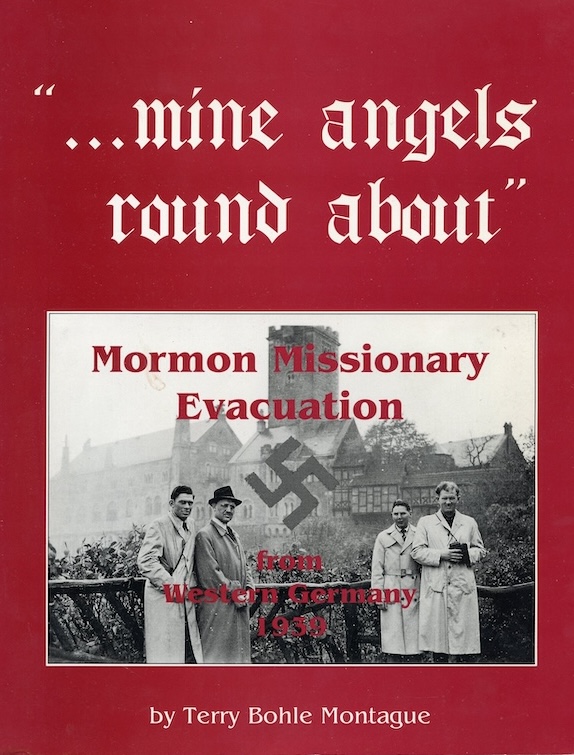
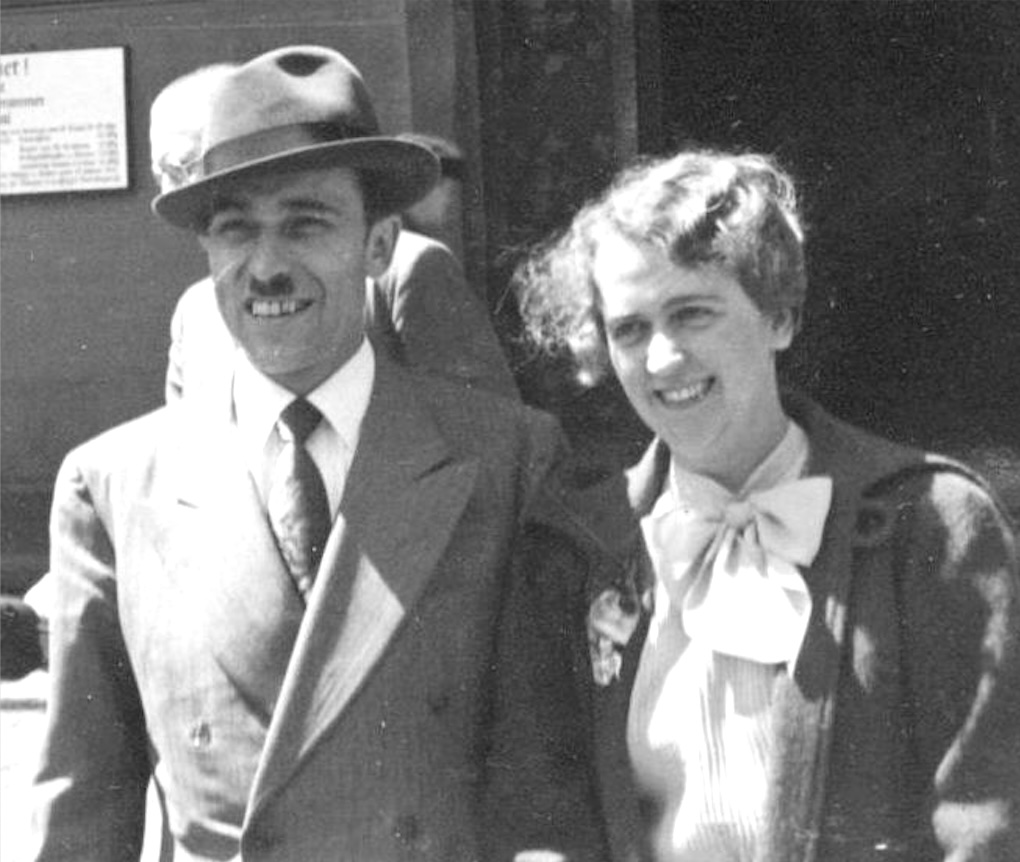
President and Sister Woods
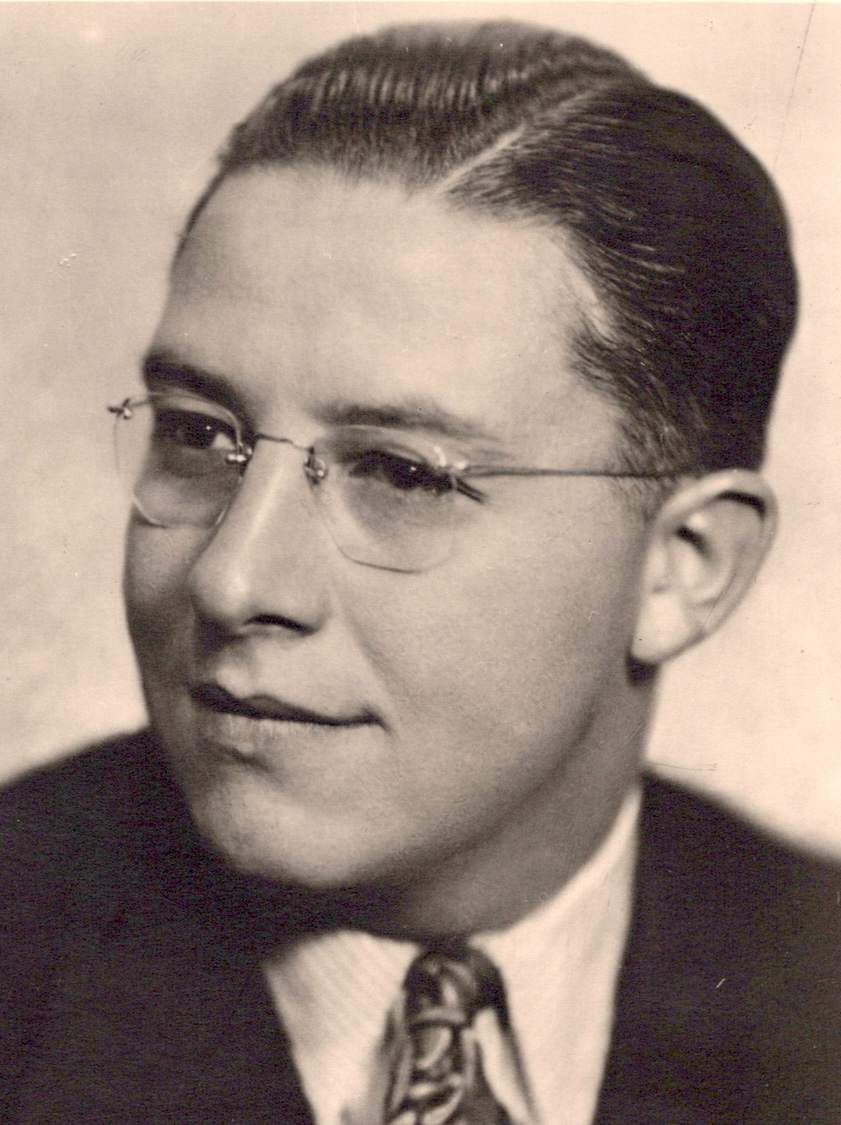
Norman G. Seibold
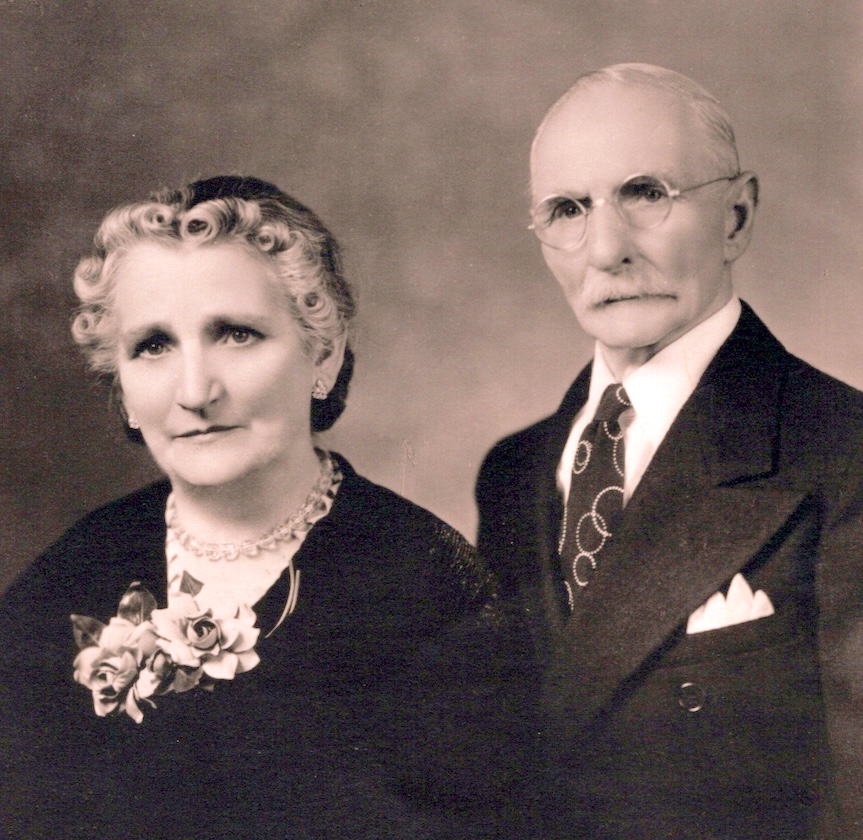
Elder and Sister Goltz
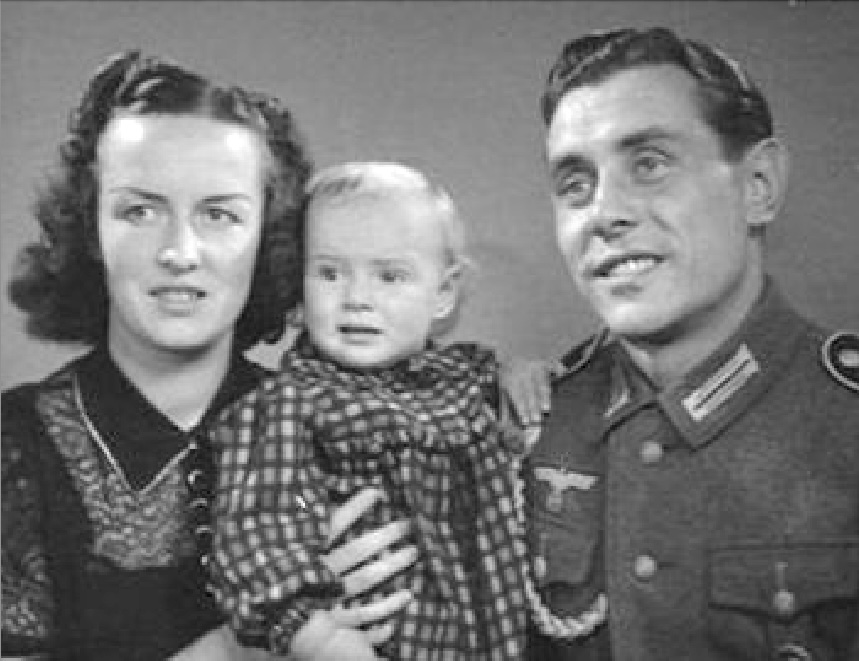
Walter Biehl Family
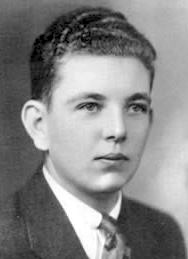
Vern Marrott
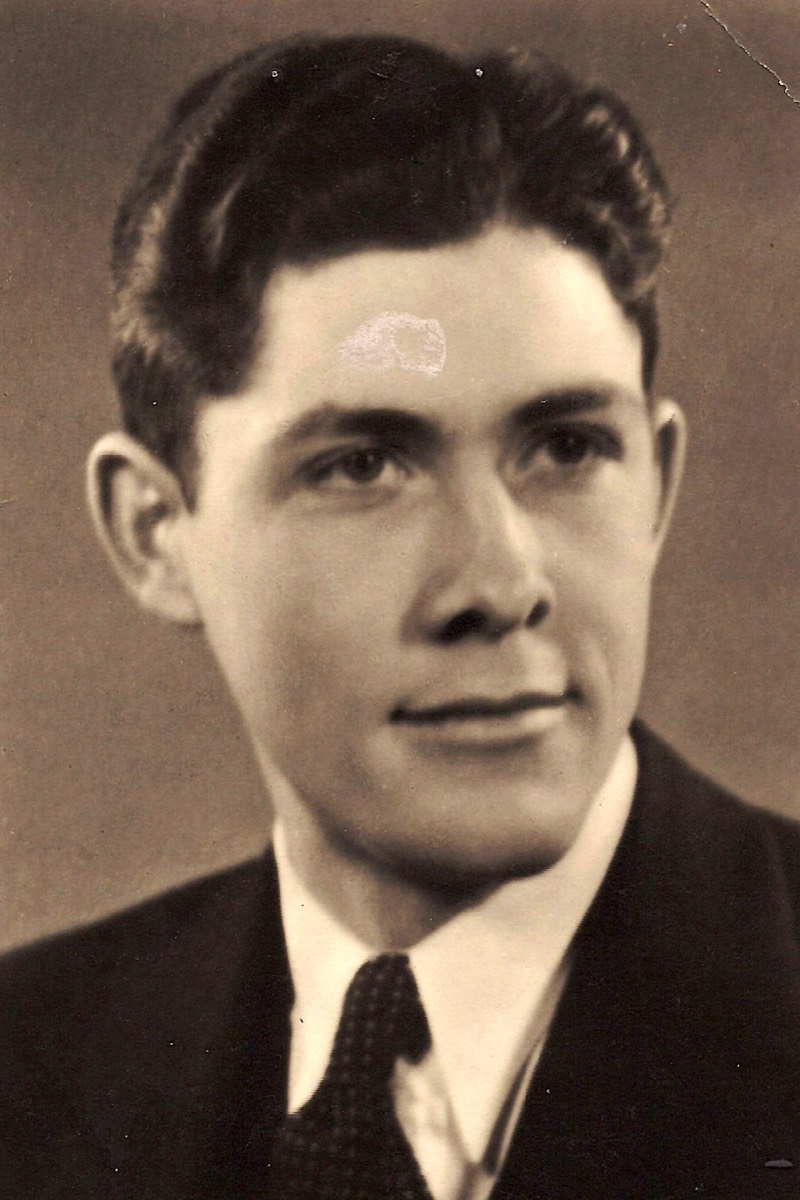
Ferryle McOmber
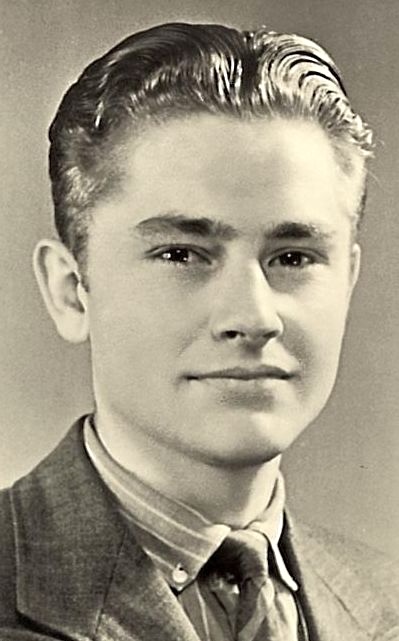
Dean Griner
An Account of the Evacuation of Missionaries of the Church Jesus Christ of Latter-day Saints from Germany in 1939
Writer Terry Bohle Montague, a Rupert, Idaho resident, became acquainted with Norman G. Seibold, also of Rupert, and from him and others learned the story of the miraculous evacuation of missionaries of the Church of Jesus Christ of Latter-day Saints from Germany in 1939. She wrote of these events in her book, titled “Mine Angels Round About”, taken from D&C 84:88:
“...I will go before your face. I will be on your right hand and on your left, and my Spirit shall be in your hearts, and mine angels round about you, to bear you up.”
The book weaves into the evacuation story a brief account of conditions in pre-war Germany. She chronicles the complications of the departing missionaries, including uncooperative and even threatening German and Dutch officials, overloaded trains, miscommunication, passengers being bumped off trains without warning to make room for troops traveling to the front, and chaotic train schedules. The book shows how creative and inspired missionaries found their way out of Germany under unlikely, but providential circumstances.
By 1938, Church members and the missionaries of the newly created West German Mission were already under scrutiny of the German officials. Some missionaries had been detained, though eventually released. But, they were forbidden to tract or hold street meetings.
“Despite these conditions, the missionaries persevered. They joined clubs and groups, even organizations connected with Hitler's Youth, to meet people and introduce them to the gospel. They participated in sports events, gave athletic exhibitions, taught classes and formed musical groups. They also relied heavily on cottage meetings in the homes of Church members. The missionaries found, however, that members and contacts only wanted to discuss the possibility of war.” (p. 12).
The efforts to preach the gospel were not successful, and, further, it was becoming clear that the missionaries were no longer safe. In August 1939 the Church’s First Presidency ordered the 84 missionaries and their mission president, M. Douglas Wood and his wife Evelyn, to leave Germany for Holland or Denmark. Their departure was met with sadness and alarm by German members. Elder Leland Blatter wrote: “August 26, 1939. We visited as many of our friends and members as we could. It was hard to leave. Some of the old members...wept and wished they could go with us. I also wished I was able to take them. It was hard leaving them after they had been so good to us, but we had to go. (p. 38)
Missionaries were instructed by telegram to go to Holland. But, the Dutch officials were not enthusiastic to receive them. Many were denied entry unless they could show they had appropriate travel tickets and money to keep on traveling, as the Dutch didn’t want the missionaries to remain in Holland as indigent refugees. Even visiting Apostle, Joseph Fielding Smith and his wife, were initially turned back at the Dutch border.
President Wood charged Elder Norman Seibold with the task of gathering the remaining missionaries.
“Seibold was given an envelope containing 500 marks and tickets to London as well as Copenhagen. He was instructed to travel the railway lines along the Dutch border and search for stranded missionaries. How he found them would be up to him, but he must see that as many as possible were evacuated to safety." (p. 48)
One senior missionary couple from America of German heritage, Elder and Sister Goltz, at first refused to leave. Elder Goltz having been promised in a patriarchal blessing that he would serve a mission in Germany, didn’t want to give up now. But, Elder Seibold eventually convinced them that obedience to the mission president was required.
Elder Seibold, arrived at 4 am in Cologne Germany, and found the train deport full of people trying to leave Germany.
“Seibold, a husky, strapping young man of over 200 pounds, fought his way out of the crowded railway car and looked up and down the platform. There were so many people in the vast Cologne depot, how on earth could he hope to find a few stranded missionaries? But this did not discourage Elder Seibold, who had been given a special mission and who had faith that heavenly help would be provided as required. Seibold, who still claims that he could never carry a tune in a bucket, climbed up onto a nearby baggage cart and, above the noise and confusion all around him, whistled the first four notes of "Do What is Right". A few people turned to stare. Seibold drew another long breath and whistled the tune again. From the crowded platform appeared Elder Ferryle McOmber and President Walter Biehl--Biehl, who was enroute to join his military unit. With only minutes before the train was to depart, Seibold briefly explained that he had been sent by President Wood to search for stranded missionaries along the Dutch border and the two offered to help. Their combined efforts, as they hurried in different directions through the depot whistling the familiar notes of "Do What is Right", netted fellow missionaries Dean Griner and William Manning who were also stranded and without funds or tickets. On a different platform at the other end of the Cologne railway station, Vern Marrott awakened on a hard bench from a restless sleep.... Suddenly he stopped. He wasn't sure he heard it. The sound came again and pierced his heart. Someone was whistling “Do What is Right”. He hurried up to the platform and found Elder Seibold. Seibold handed Marrott an envelope and said ‘I'm not going to take the time to explain now because there is none. Just get on this train and then open the envelope. You'll find instructions inside.’" (pp. 70-71)
Seibold, traveling with five Elders, arrived at the Emmerich train station where they were accosted by a city policeman. Seibold stood his ground, insisting that a city policeman had no authority over him and demanded that a military policeman be called. After heated words, the policeman escorted them to the office of the military police.
“The military police captain heard the account of the incident with an expressionless face, his eyes hard and cold. When the policeman finished, the captain, in harsh tones and strong language, reminded the officer that no city policeman had authority in a railway station, and ordered the city officer to leave the depot and not return. Then the captain turned his attention to the two missionaries who stood before his desk and demanded an explanation. When Seibold finished, the captain nodded. He knew of the Mormons, he replied, and he could easily understand why the missionaries must leave Germany. ‘I'm going to write a pass for you,’ the captain told Seibold. ‘If you have any difficulties in the railway stations as you leave, just show this to the proper authorities.’ Then he folded the sheet of paper and handed it to Seibold who tucked it in his coat pocket.” (p. 73)
They left on the next train without further incident.
Upon Seibold’s return to Denmark, he was again sent on a scouting expedition. He stopped at several stations, got off and whistled the song with no results.
“In the Neumunster depot, Seibold walked restlessly up and down the platform. A silent but clear urging from within took him out of the station and into the street. Then down another street and around the corner. He stopped in f ront of a Gasthaus--a pub. It wasn't the sort of place a missionary was likely to frequent. However, the unmistakable feeling became stronger and propelled Seibold through the door. There, seated at a table were two young men in dark suits and white shirts. There was no doubt about their identities. One of them glanced up at the door. Surprise, then relief flooded his face. He came out of his chair with a bound, hand outstretched. ‘Am I ever glad to see you!’ he exclaimed, and pumped Seibold's hand up and down. ‘I'll never forget the look in that man's eyes,’ Seibold later recorded. The two stranded missionaries2 had found their way to the Gasthaus, exhausted and hungry, and spent the last of their money on fruit juice. Until Seibold came through the door, they had no idea what they should do or where they should go. Seibold gave the pair two tickets to Copenhagen and enough money for a decent meal. Then he saw them onto the north-bound train.” (pp. 82-83)
Other escapes:
President and Sister Wood, their two daughters and the missionaries from the mission office were traveling together. Several times they were bumped off the train to make room for soldiers. They finally made it to Rostock, hoping to catch the ferry to Denmark.
“But at Rostock, the engineer and fireman stopped the engine and left the train for lunch. The missionaries were told the train would go no further. According to J. Richard Barnes, the missionaries then took matters into their own hands. When the crew had disconnected the cars from the engine and left the station, some of the members of the mission office staff got in the engine, figured out the control gears and put the train into motion, heading for the dock at Warnemuende. As they approached the dock, the ferry was just beginning to pull away. The missionaries leaned out of the windows and shouted, calling for the ferry captain to wait for them. Several missionaries, who had small American flags and their luggage, waved them. The captain re-docked and members of the crew rushed to help them aboard.” (pp.62-64)
They eventually arrived in Denmark and were greeted by the Danish mission president. (At the time of writing the first edition of her book, Montague did not have the names of these missionaries, but later found out they were J. Ralph Thompson and Wesley Knudsen. )
Dutch missionary, Elder John Robert Kest, was sent by train from Holland to Germany with money and train tickets for stranded missionaries. The train stopped in Bentheim, Germany. Nazi guards took him off the train for questioning. He pretended he couldn’t speak German or Dutch.
“It was fortunate that the German officer in charge spoke rather poor English. As I went on, talking disjointedly, tossing in a Dutch or German phrase here and there, the effect I wished to produce took hold of the men. They must have concluded that here was a simple, foolish American trying to see some friends for no good reason.... They confiscated binder, papers, passport, and all the money on my person and started going through each pocket in both my coat and vest. I took the 10 tickets out of my pocket and placed them on the table before me. No one seemed to see the tickets! The officer in charge gave me a receipt for the money, binder, papers and all my personal effects and said, ‘you have 40 minutes to catch the return train to Holland. After that time we cannot guarantee your safety.’ Taking the tickets from the table, I stuffed them in my pocket. Not an eye flickered. I had the strong impression that the action had been entirely unobserved. Hurriedly I left the station, my knees weak, my palms sweating!” (p. 67).
Elder Kest eventually found the missing missionaries in a nearby hotel and told them to leave immediately.
“The Elders needed no urging, and in less than five minutes were ready, having very little luggage with them. Quickly kneeling down, we held a prayer circle and asked our Father that we might be safely conducted to our respective destinations. As the seven of us knelt in fervent prayer, we all felt a closeness and unity experienced very infrequently in life. We were truly united and prayed with power and faith, believing our requests would be granted, for we realized the desperate nature of our situation." (pp. 67-68)
The missionaries caught the train to Denmark. Elder Kest returned safely to Holland.
These are only a few examples from the courageous and inspired actions of those being evacuated and those assisting them. Montague concludes:
“But whatever the courses of their lives, the experiences of the missionaries who served in the West German Mission during the turbulent years of 1938 and 1939, and especially during that hot, humid August of their evacuation, have left upon those involved an influence so profound that it cannot be dimmed by memories that fade over the years. Perhaps these missionaries have a sharper understanding of a missionary’s love for the people he serves and teaches. An understanding of the desire to serve the Lord, no matter what the situation or how inconvenient and frustrating it may seem. An understanding of tolerance, of loving and caring for someone as a child of God despite his country's political activities. An understanding of faith, that in serving the Lord He will literally send angels to bear up his servants.” (pp.114-5).
Former mission president Douglas Wood was invited to bear his testimony in the Church’s April 6, 1940 General Conference:
“I am happy to have had this opportunity of working in Germany among the German people. I am happy to have had the privilege of being there during those hard times. The Lord stood at our side and never once did we want or were we unable to meet the situations at hand with His help. May we be generous in our judgments and tolerant toward all God's children, here in safety, in luxury, in our homes in the Land of the Free, is my humble prayer, and I ask it in Jesus name, Amen.” (p..115)
(Prepared by Ken Earl Publications and published by Roylance Publishing, Murray, Utah, 1989; copyright Terry Bohle Montague, all rights reserved. Quotations used with permission. The new revised book is available on Amazon.)
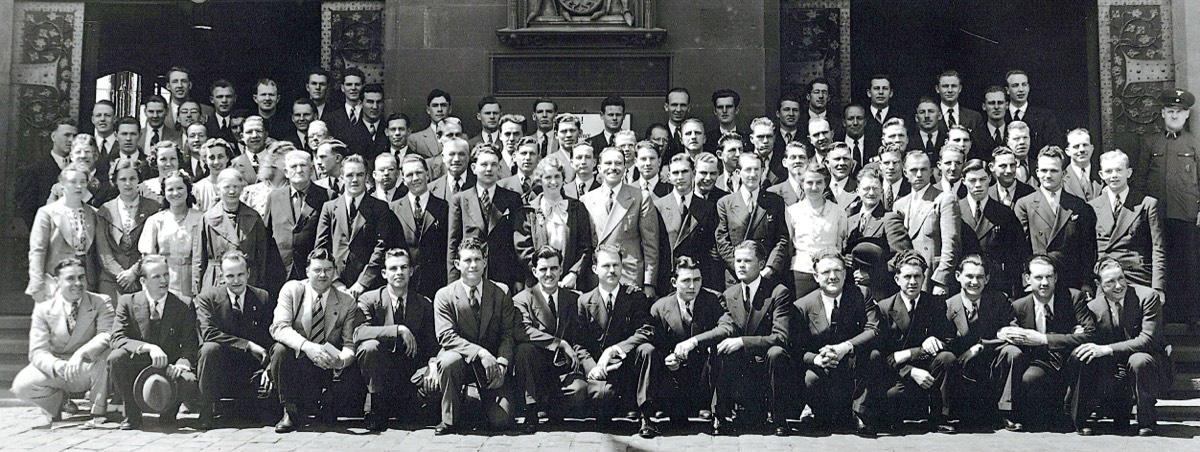
West German Missionaries - Romberg, Germany Conference
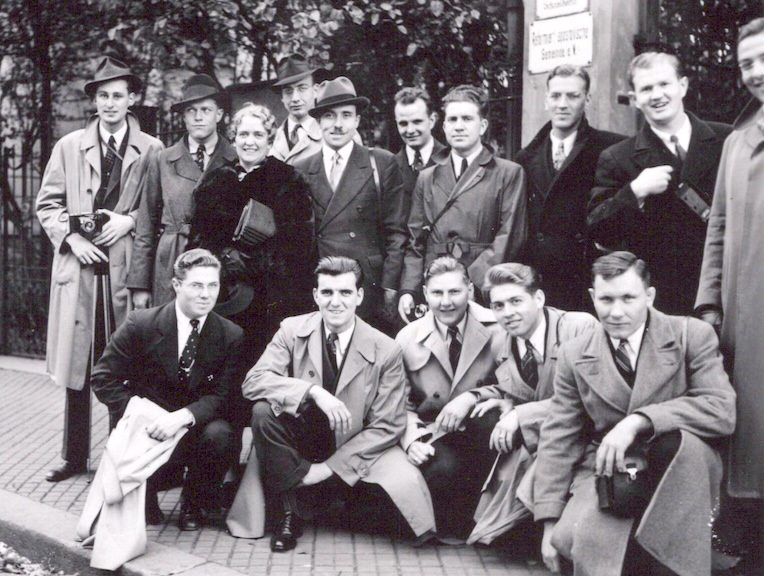
District Conference with President Woods
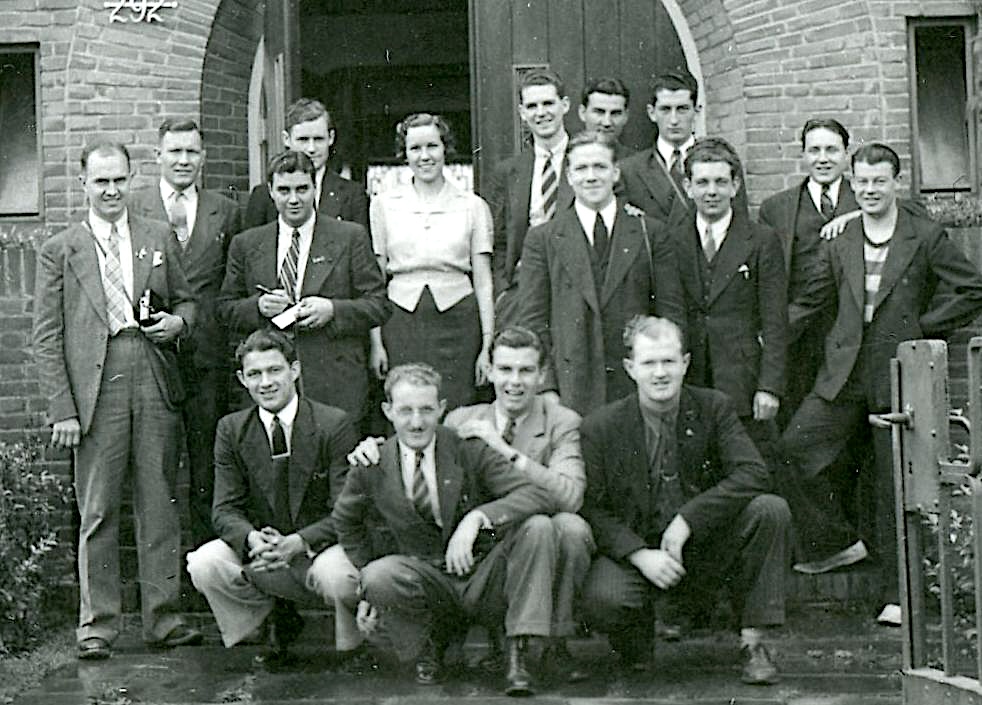
1st row, John Wesche, Clark Hilam, George Peter Kuhn, and Fred (Fritz) Duehlmeier. 2nd row, Clarence Buehner, Reed Oldroyd, William George Goold, Vern Marrott, and Vern's cousin, Dutch Mission Elder John Robert Kest. 3rd row, Robert Kunkel, Dwayne Ward, Erma Rosenhan, George Wimmer, John Wells, and Walter Welti.
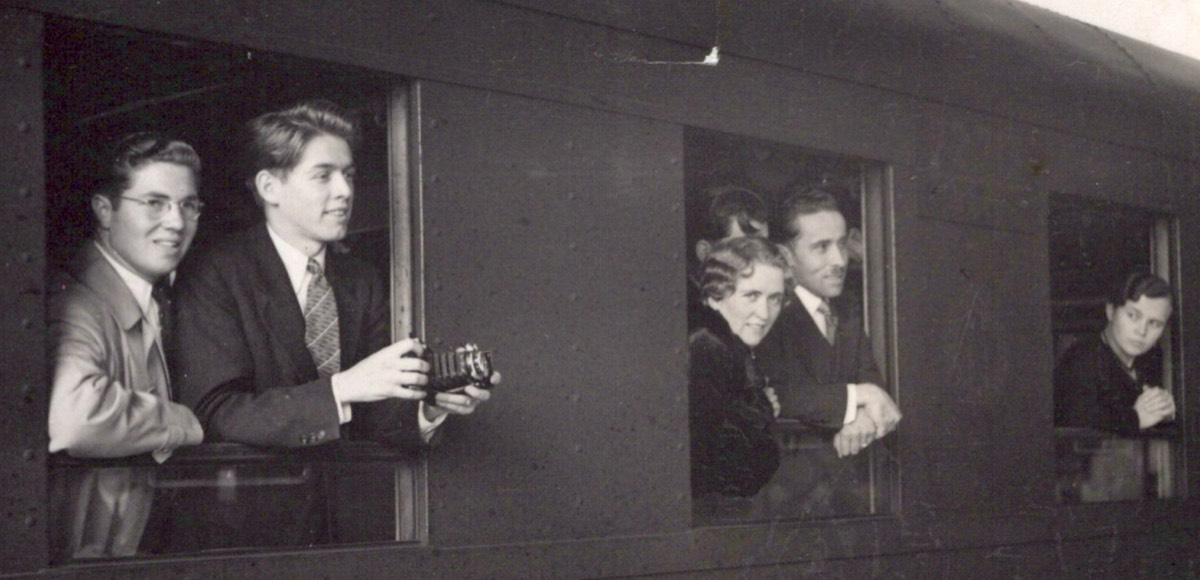
President & Sister Woods with missionaries leaving on train
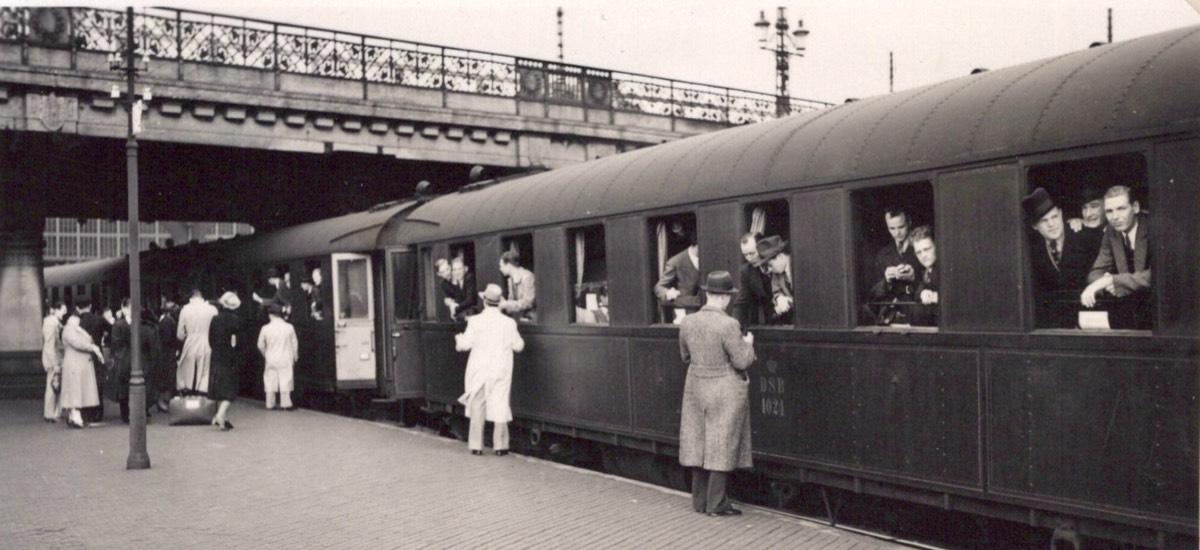
Missionaries first evacuation
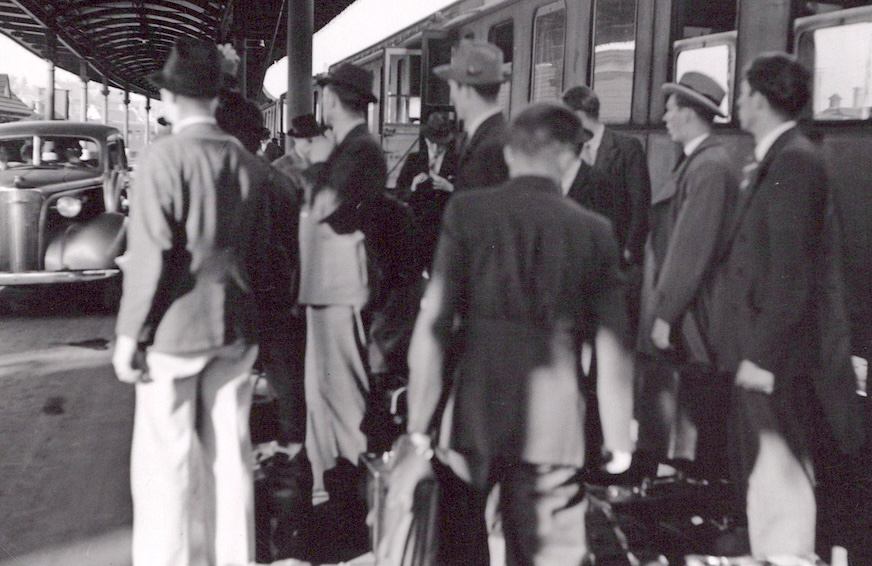
"We gotta get out of this place"
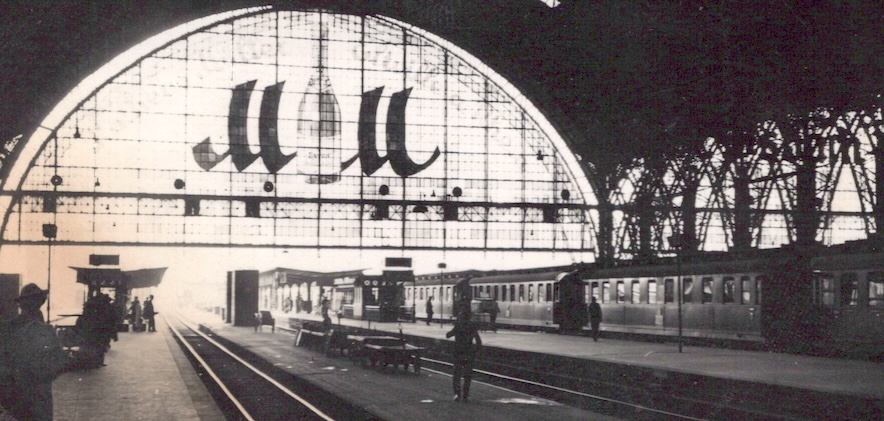
Stuttgart Train Depot
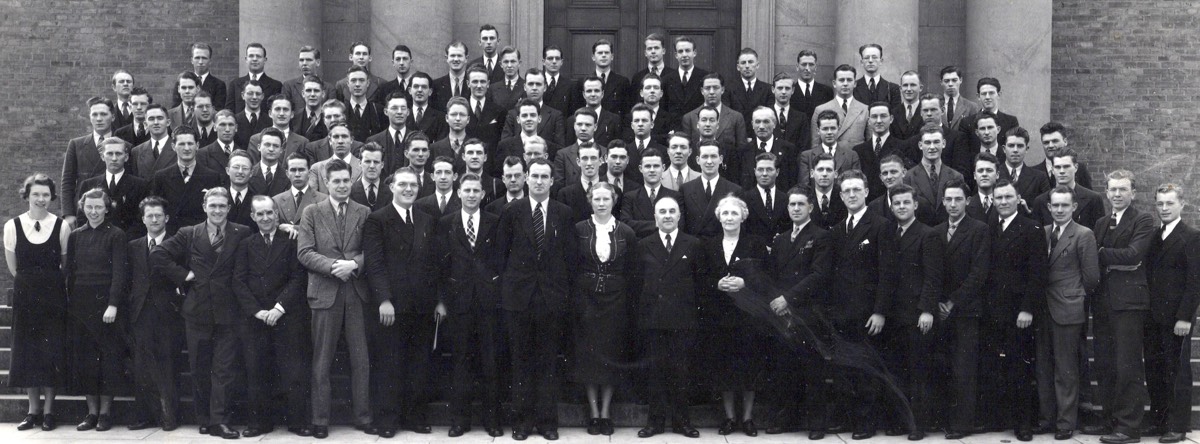
Evacuees in Copenhagen
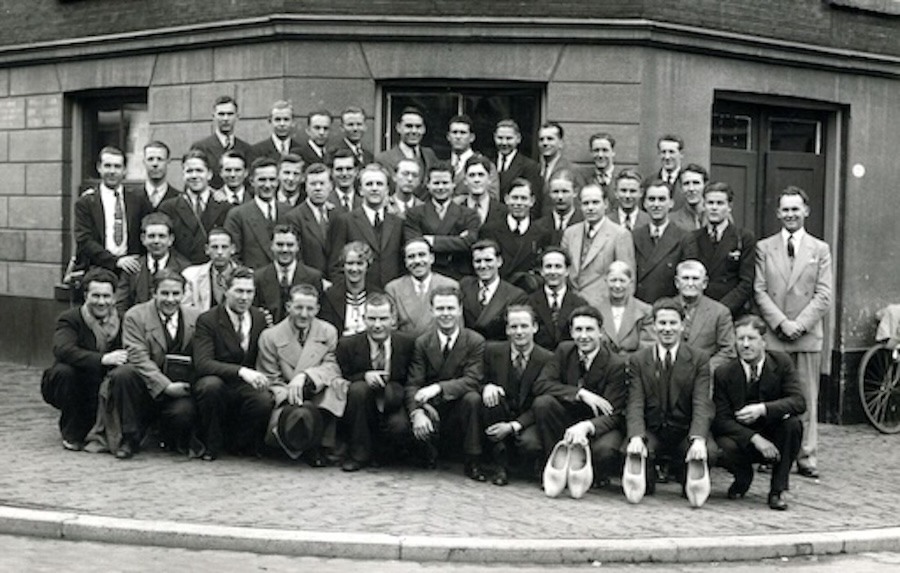
Evacuated missionaries in Holland
